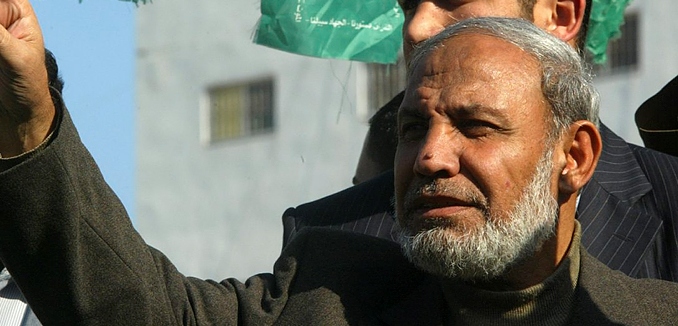Senior Hamas official Mahmoud al-Zahar said that armed resistance against Israel is not negotiable, according to a report published on the Saudi-backed website Alresalah on Monday.
Armed resistance is not a political issue that may be negotiated, said al-Zahhar in a meeting organized by Hamas and the Islamic Jihad in Khan Younis City on Sunday to commemorate the day Jerusalem was occupied.
“It is neither a controversial, nor a negotiable issue; it is, rather, dogmatic fundamental cause in struggle with Israel,” said al-Zahhar, referring to armed resistance, pointing out that Israel has long sought to erase the Palestinian constants, concerning the Palestinian lands, Jerusalem and Al-Aqsa Mosque.
Al-Zahhar stressed that the Islamic Resistance Movement (Hamas) refuses a Palestinian state within the 1967 or 1948 territories, saying “Our policy is Palestine, all of Palestine”. He explained that Palestine as a whole is a part of the Islamic dogma that is derived from the Holy Qura’an.
Despite reports of friction between Hamas and Palestinian Islamic Jihad (PIJ), al-Zahhar said that the two groups enjoy “full coordination” in military matters.
Al Zahar’s remarks come in the wake of several rockets strikes against Israel by Gaza-based terrorist in recent weeks, including one that was reportedly carried out by PIJ.
While Hamas has publicly been distancing itself from these attacks and their potential consequences, late last month security expert Dr. Shaul Bartal wrote that Hamas has been using front organizations that allow it to carry out attacks against Israel without being held directly responsible.
The Grad rocket that exploded near Ashdod on Tuesday and Israel’s retaliation shortly thereafter raised concerns of escalation once again. Various commentators argued that perhaps Hamas was not responsible for the rocket, which was fired from the Hamas-controlled Gaza Strip. Perhaps it was a rogue group like Islamic Jihad or the Salafist groups that operate there, so Israel mustn’t view the rocket fire as a violation of the cease-fire agreement reached with Hamas following the last war. In any case, extreme caution is required.
This is not the first time that Hamas violates a cease-fire agreement and chooses to lay the blame on some other organization. At times the blame is placed with organizations unknown to Israeli authorities. For example, in May 2011, the interrogation of Ayub Azzam Ahmed, aka Abu Karim, from Gaza revealed the existence of the “Defenders of al-Aqsa” — a front organization handled by Hamas meant to carry out attacks against Israel in which Hamas involvement would not be apparent.
This organization was presented as a rogue group that does not yield to Hamas directives, and therefore Israel could not blame Hamas for its violations. The key actor behind this mechanism is former Hamas minister Fathi Hamad, who is closely affiliated with Hamas’ armed wing. Together with military commander Mohammed Deif, Hamad has shaped Hamas’ militant policy toward Israel. Abu Karim was arrested and indicted in 2011, but the system remains in place. Hamas continues to carry out terrorist attacks against Israel by way of small, little-known groups directly overseen by Hamas officials, thereby distancing Hamas from culpability.
[Photo: Abed Rahim Khatib / Flash 90 ]




